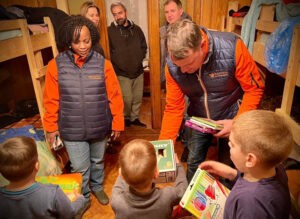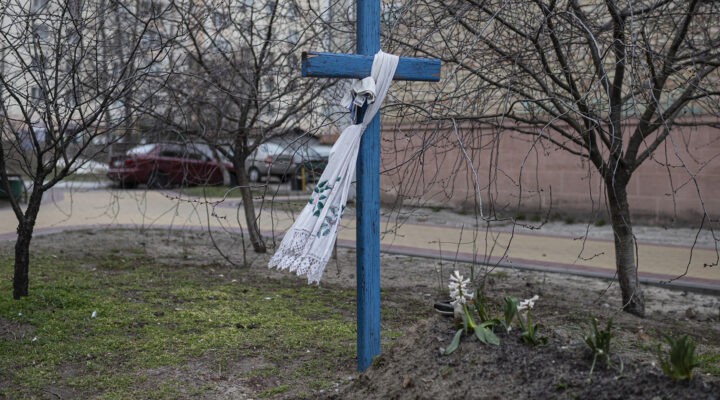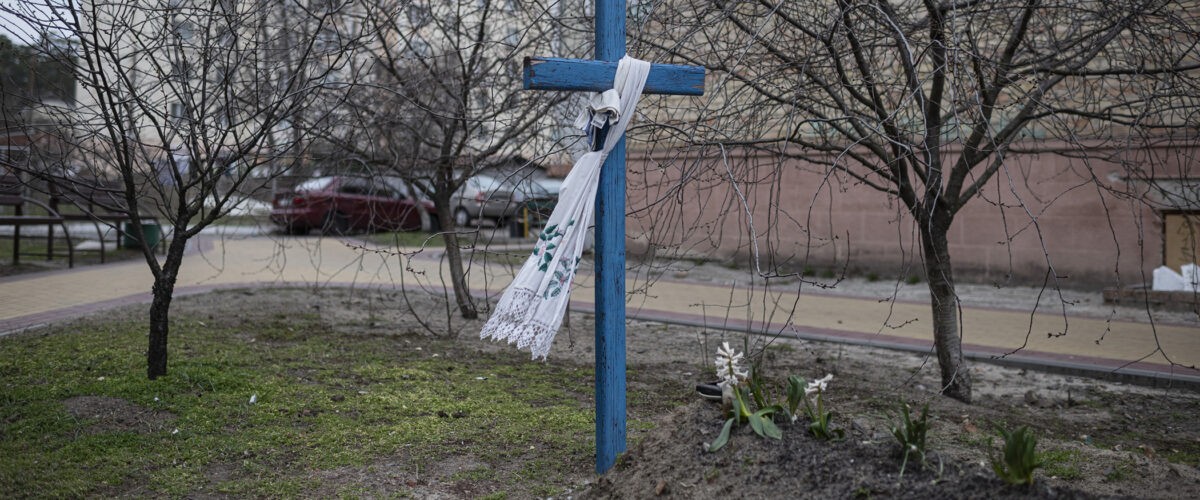Christians mustn’t become complacent about the spiritual and physical needs of Ukrainians and those ministering to them as the war with Russia grinds on, said Marsha Scipio, the leader of global aid efforts for the Baptist World Alliance.
“Even though we may be tired of hearing the news over and over again, we cannot forget that real people are being affected by this tragedy and we must not forget to keep asking, ‘How do we as Baptists come alongside them to support them?’”

Marsha Scipio (center) with BWAid workers in Ukraine.
Scipio, director of Baptist World Aid, visited Ukraine, Romania and Hungary in March to see how Baptists have rallied to assist displaced persons within Ukraine and its refugees in neighboring countries.
So far, Baptists in the region have helped, in one way or another, more than 650,000 refugees under the harshest conditions. Members of the BWA Forum for Aid and Development, or BFAD, have raised $4 million to help with training, food and other necessities.
Overall, she described the dizzying effort as a demonstration of the Bible’s command to care for the alien: “You see so many Baptist churches and leaders and lay people really engaged in demonstrating that love for the stranger.”
Baptist efforts to care for refugees and other war victims have been creative and tireless, she added.
In coordination with the European Baptist Federation, Baptist unions in and around Ukraine have transformed more than 600 churches into refugee centers that serve as temporary shelters, feeding sites and transportation hubs capable of connecting refugees with relatives in other nations or with longer-term housing in other areas.
Some of the centers also provide medical care, interpreters, translators and help in obtaining critical documentation lost while fleeing Russian forces, she said.

Distributing gifts to displaced Ukrainian children.
“In Romania, they developed an app enabling them to track how many refugees are in each site and when they arrive and leave. They can click to see how many beds are open and the availability of transportation. They are literally operating their own Uber system to move people around. It’s just mind blowing to see what people are doing. It’s a holistic approach. It’s not just about giving people a plate of food.”
Her recent trip served several purposes, Scipio said. “It was mostly about listening and understanding and hearing what was happening. We have been funding many of these unions, so we wanted to get a sense of the work they are doing. It gives us a deeper understanding of the needs so we can therefore direct the funding more strategically so a larger number of people can be served.”
The experience also helps BWA better articulate the situation and the needs of churches, which provide the critical funding needed to maintain the effort in Ukraine and surrounding nations, she said.
“You think of refugees as this monolithic group, but not when you get to hear the individual stories and how their needs are being met in a time like this. That helps us pray more specifically in many ways. It gives us more understanding what to pray for. There’s something to be said about being there and being in front of your computer at home.”
But Scipio said her tour also raised the issue of caring for those ministering to refugees. “How do we support pastors and leaders in this process? What does pastoral care in the middle of conflict look like?”
Many pastors are suffering financially because their own congregations have fled and, as bivocational minsters, their employment has ended during the war.
“I remember a pastor in Romania telling me, ‘I am just tired and my wife is crying all the time because we are working around the clock.’ This is what burnout looks like when you are doing this 18 to 20 hours a day.”
Scipio said she heard an answer to that question in a recent sermon by Igor Bandura, vice president of the All-Ukrainian Union of Churches of Evangelical Christian-Baptists. The message marked the 40 days since the Feb. 24 Russian invasion and connected the challenges facing churches to that of Jesus spending 40 days in the wilderness.
“He said, ‘Yes, we are in the midst of those 40 days, but we have to persevere. Like Jesus, we must continue and resist the temptation to leave what God has called us to do in this time and space.”
But Baptists in other parts of the world must remain diligent as well, both through prayer and giving, Scipio added.
“It’s a difficult time, but if we as Christians miss this opportunity to demonstrate God’s love, it’s our fault because the opportunity is here. We must be God’s hands and feet — that is how Ukrainians will know that God is present. God is making provision and we have a responsibility to make sure that is shared, that that love of Christ is communicated in very tangible ways.”
Related articles:
Ukrainian seminary dean among those shot dead and left on the street by Russian troops
Baptists in countries bordering Ukraine open their doors to fleeing refugees
As Ukrainian Baptists continue to shelter and feed neighbors, a CBF ministry center is bombed
Ukraine’s just war | Opinion by David Gushee


